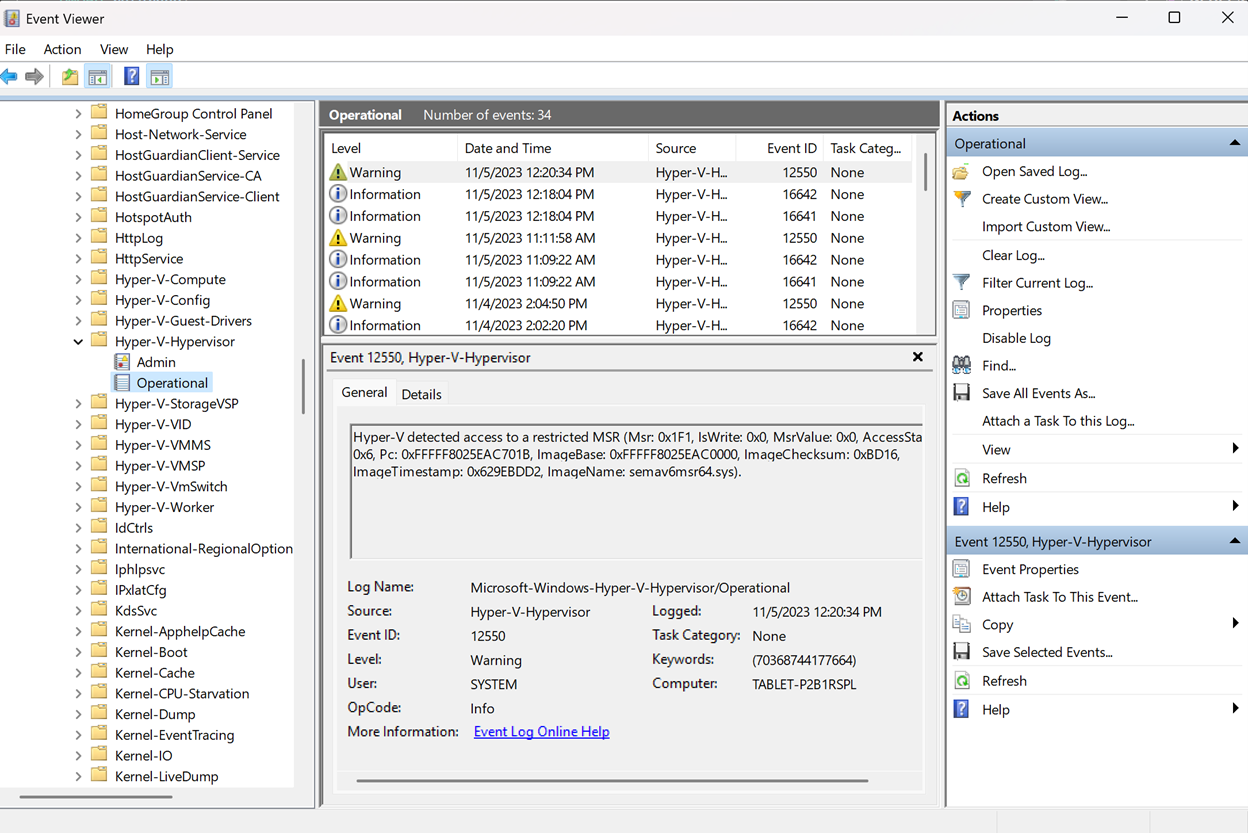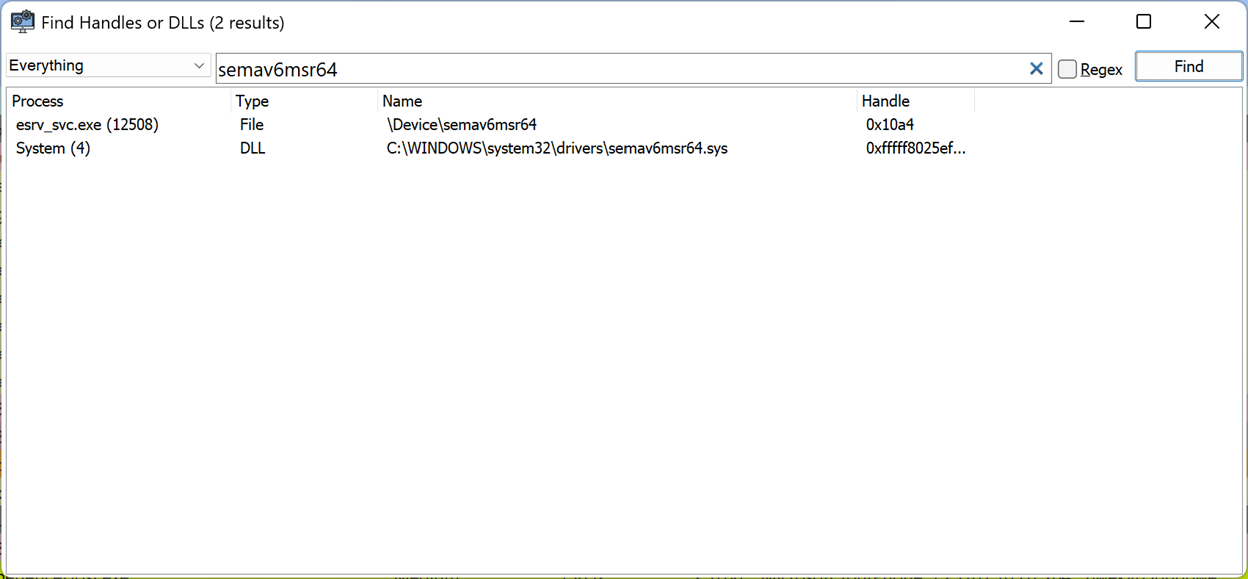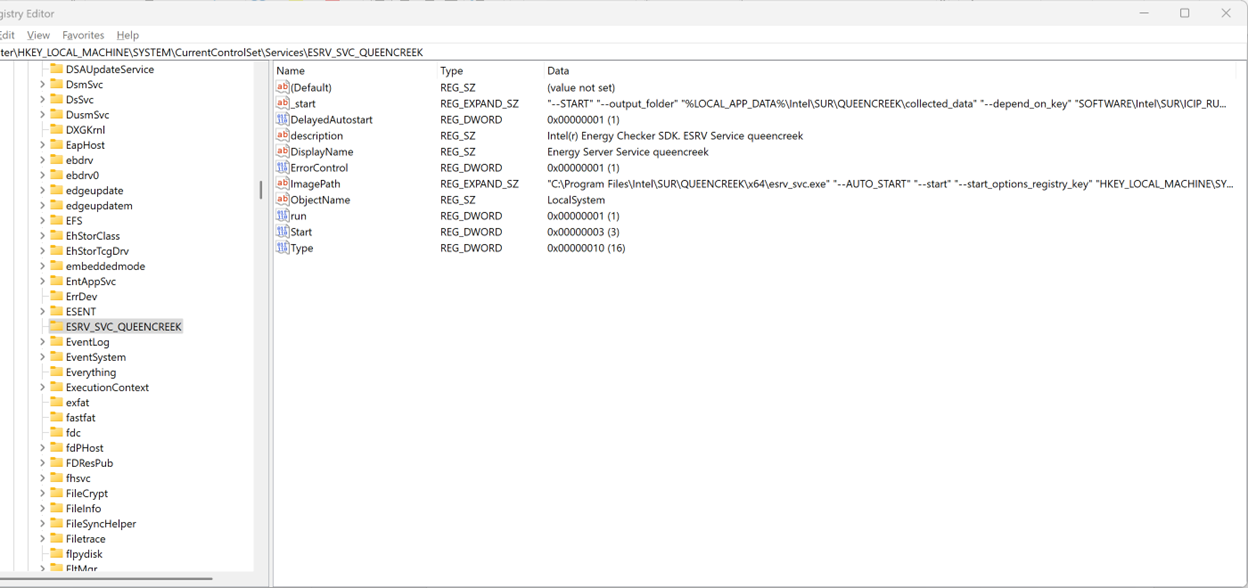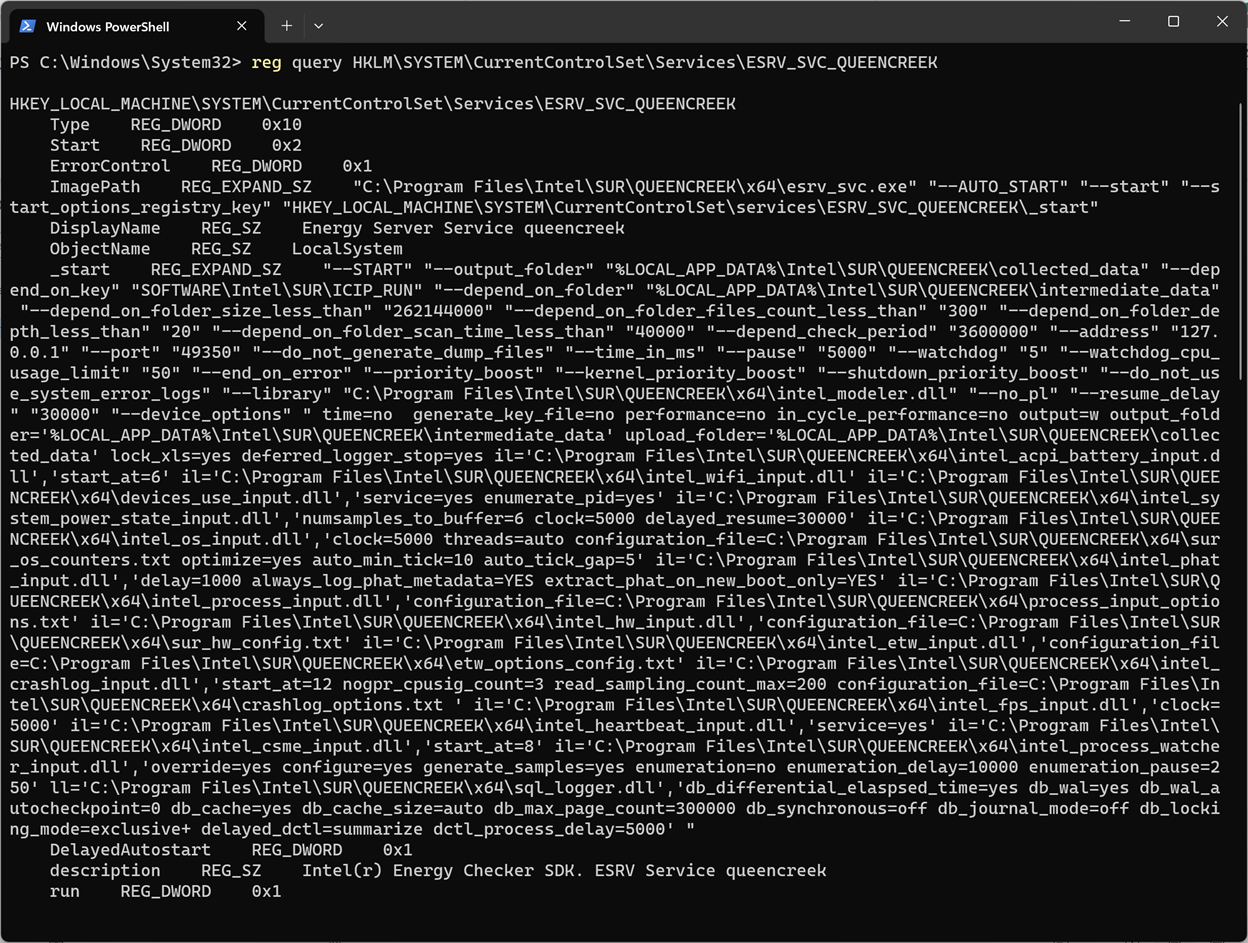One day my system started crashing. A lot. Multiple blue screens per day, with a few different error codes. The worst part – even though my system was configured to collect full memory dumps, no crash dumps were generated (not even mini dumps). They failed to get written every single time, so I couldn’t analyze them to try and get to the root of the problem.
Before giving up and re-imaging my machine, I decided to take a look at Event Viewer to maybe get some hints to what might be going wrong, and maybe find a way to fix it. I started with the Application and System logs found under the “Windows Logs” category. Those didn’t have any information besides generic events letting me know that my system crashed and that a dump file could not be written. And I already knew both of these things.
So, I went to look at other ETW events, with the vague hope of finding something useful. I ended up finding it in an unexpected place – the Microsoft-Windows-Hyper-V-Hypervisor channel:
This really isn’t giving me much information and is in no way an indicator that this is the cause of the crashes, but this is the only unusual thing I could find so it’s a start.
On a side note, I couldn’t find any information about MSR 0x1F1 or why it should be blocked by Hyper-V. If anyone has any information to share with me, I’d be happy to learn! You might also notice that this ETW message discloses some kernel pointers, which is an interesting piece of data. But this is unrelated to the topic of this post so I’ll move on.
Now, let’s look at this driver. This is the “Intel System Usage Report” driver, and there really isn’t much information about what it is or what it’s meant for. This driver creates a device with the same name, so finding the process that uses this driver is easy, using the System Informer search function:
Esrv_svc.exe is a process that runs through the ESRV_SVC_QUEENCREEK service, which is described as “Intel(r) Energy Checker SDK. ESRV Service queencreek”. When looking at the image path that gets executed when the service starts, we can see an unusual path:
"C:\Program Files\Intel\SUR\QUEENCREEK\x64\esrv_svc.exe" "--AUTO_START" "--start" "--start_options_registry_key" "HKEY_LOCAL_MACHINE\SYSTEM\CurrentControlSet\services\ESRV_SVC_QUEENCREEK\_start"
Of course, the next step is to look at the service registry key that is referenced in this command:
The _start registry value is a long command that doesn’t fit in the regedit view, no matter how much I expand it. So I’ll dump it from the command line with reg query:
reg query HKLM\SYSTEM\CurrentControlSet\Services\ESRV_SVC_QUEENCREEK
Type REG_DWORD 0x10
Start REG_DWORD 0x2
ErrorControl REG_DWORD 0x1
ImagePath REG_EXPAND_SZ "C:\Program Files\Intel\SUR\QUEENCREEK\x64\esrv_svc.exe" "--AUTO_START" "--start" "--start_options_registry_key" "HKEY_LOCAL_MACHINE\SYSTEM\CurrentControlSet\services\ESRV_SVC_QUEENCREEK\_start"
DisplayName REG_SZ Energy Server Service queencreek
ObjectName REG_SZ LocalSystem
_start REG_EXPAND_SZ "--START" "--output_folder" "%LOCAL_APP_DATA%\Intel\SUR\QUEENCREEK\collected_data" "--depend_on_key" "SOFTWARE\Intel\SUR\ICIP_RUN" "--depend_on_folder" "%LOCAL_APP_DATA%\Intel\SUR\QUEENCREEK\intermediate_data" "--depend_on_folder_size_less_than" "262144000" "--depend_on_folder_files_count_less_than" "300" "--depend_on_folder_depth_less_than" "20" "--depend_on_folder_scan_time_less_than" "40000" "--depend_check_period" "3600000" "--address" "127.0.0.1" "--port" "49350" "--do_not_generate_dump_files" "--time_in_ms" "--pause" "5000" "--watchdog" "5" "--watchdog_cpu_usage_limit" "50" "--end_on_error" "--priority_boost" "--kernel_priority_boost" "--shutdown_priority_boost" "--do_not_use_system_error_logs" "--library" "C:\Program Files\Intel\SUR\QUEENCREEK\x64\intel_modeler.dll" "--no_pl" "--resume_delay" "30000" "--device_options" " time=no generate_key_file=no performance=no in_cycle_performance=no output=w output_folder='%LOCAL_APP_DATA%\Intel\SUR\QUEENCREEK\intermediate_data' upload_folder='%LOCAL_APP_DATA%\Intel\SUR\QUEENCREEK\collected_data' lock_xls=yes deferred_logger_stop=yes il='C:\Program Files\Intel\SUR\QUEENCREEK\x64\intel_acpi_battery_input.dll','start_at=6' il='C:\Program Files\Intel\SUR\QUEENCREEK\x64\intel_wifi_input.dll' il='C:\Program Files\Intel\SUR\QUEENCREEK\x64\devices_use_input.dll','service=yes enumerate_pid=yes' il='C:\Program Files\Intel\SUR\QUEENCREEK\x64\intel_system_power_state_input.dll','numsamples_to_buffer=6 clock=5000 delayed_resume=30000' il='C:\Program Files\Intel\SUR\QUEENCREEK\x64\intel_os_input.dll','clock=5000 threads=auto configuration_file=C:\Program Files\Intel\SUR\QUEENCREEK\x64\sur_os_counters.txt optimize=yes auto_min_tick=10 auto_tick_gap=5' il='C:\Program Files\Intel\SUR\QUEENCREEK\x64\intel_phat_input.dll','delay=1000 always_log_phat_metadata=YES extract_phat_on_new_boot_only=YES' il='C:\Program Files\Intel\SUR\QUEENCREEK\x64\intel_process_input.dll','configuration_file=C:\Program Files\Intel\SUR\QUEENCREEK\x64\process_input_options.txt' il='C:\Program Files\Intel\SUR\QUEENCREEK\x64\intel_hw_input.dll','configuration_file=C:\Program Files\Intel\SUR\QUEENCREEK\x64\sur_hw_config.txt' il='C:\Program Files\Intel\SUR\QUEENCREEK\x64\intel_etw_input.dll','configuration_file=C:\Program Files\Intel\SUR\QUEENCREEK\x64\etw_options_config.txt' il='C:\Program Files\Intel\SUR\QUEENCREEK\x64\intel_crashlog_input.dll','start_at=12 nogpr_cpusig_count=3 read_sampling_count_max=200 configuration_file=C:\Program Files\Intel\SUR\QUEENCREEK\x64\crashlog_options.txt ' il='C:\Program Files\Intel\SUR\QUEENCREEK\x64\intel_fps_input.dll','clock=5000' il='C:\Program Files\Intel\SUR\QUEENCREEK\x64\intel_heartbeat_input.dll','service=yes' il='C:\Program Files\Intel\SUR\QUEENCREEK\x64\intel_csme_input.dll','start_at=8' il='C:\Program Files\Intel\SUR\QUEENCREEK\x64\intel_process_watcher_input.dll','override=yes configure=yes generate_samples=yes enumeration=no enumeration_delay=10000 enumeration_pause=250' ll='C:\Program Files\Intel\SUR\QUEENCREEK\x64\sql_logger.dll','db_differential_elaspsed_time=yes db_wal=yes db_wal_autocheckpoint=0 db_cache=yes db_cache_size=auto db_max_page_count=300000 db_synchronous=off db_journal_mode=off db_locking_mode=exclusive+ delayed_dctl=summarize dctl_process_delay=5000' "
DelayedAutostart REG_DWORD 0x1
description REG_SZ Intel(r) Energy Checker SDK. ESRV Service queencreek
run REG_DWORD 0x1
This command line has a lot of DLL paths and configuration options. There are some interesting persistence options here (which require running as admin) – replace any of the DLLs in the command with your own DLLs and you’ll get code execution when the service starts. This service also uses some batch and VBS files which are executed on installation, update and uninstallation. Those have some other interesting persistence options, though they also require admin privileges to use.
But the parts relevant to my system crashes are the configuration flags. First, thedo_not_generate_dump_files flag might be the one responsible for the lack of dump files after system crashes. Second, the --watchdog_cpu_usage_limit 50 flag might be responsible for the crashes themselves by crashing the system when the CPU usage gets too high.
To try and resolve the issue I disabled this service and all its related services. It did make my system crash less, but didn’t stop the crashes completely, so looks like this was only part of the problem. Crash dump generation didn’t resume, so my guess was wrong (later on I learned that it might be a bug in securekernel.exe causing that issue).
This investigation didn’t have a very satisfying resolution, as I didn’t find a complete fix for the repeated crashes or lack of memory dumps (yet!). But I thought the research process itself might be interesting enough to publish it, and hopefully it’ll help some other people.



